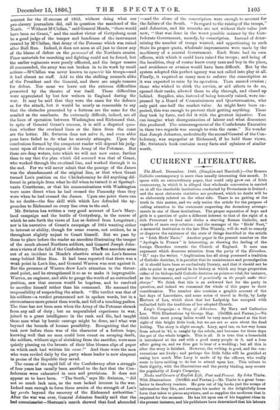CURRENT LITERATURE.
The Month. December. 1866. (Simpkin and Marshall.)—Our Roman Catholic contemporary is more than usually interesting this month. It opens with an extraordinary paper, that could only grow out of Irish controversy, in which it is alleged that wholesale conversion is carried on in all the charitable institutions conducted by Protestants in Ireland ; and the most elaborate statistics are produced, which no doubt will be as elaborately refuted on the other side. There is no getting at the truth in this matter, and we only notice the article for the purpose of calling attention to the statement respecting the dormitory arrange- ments in one of these institutions. The proper separation of boys and girls is a question of quite a different interest to that of the right of a. rich Protestant to feed and clothe a starving Roman Catholic, and capable of more easy solution ; and the manager of the "Birds' Nest,' a memorial institution to the late Miss Whately, will do well to remedy or disprove the existence of the state of things described in the article on "Irish Birds' gests." Another paper in the present number on the "Apologia in France" is interesting, as showing the feeling of the foreign Churches towards the Church of England. It uses one argument which deserves attention from the party of the Eirenikon. "If," says the writer, "Anglicanism has all along possessed a tradition of Catholic doctrine, it is peculiar that its maintenance and promulgation of it should have been so exclusively literary, and that it should not be able to point to any period in its history at which any large proportion either of its bishops held Catholic doctrine on points so vital, for instance, as the Sacraments, and enforced it practically on the people under their charge." We think that this is an awkward fact for the party in. question, and indeed we commend the whole of this paper to their consideration. The number also contains a graphic account of the last days of Lacordaire, and some notes of travel in Sicily, by Lady Herbert of Lea, which show that her Ladyship has accepted with unlimited faith the traditions of her adopted Church.


































 Previous page
Previous page